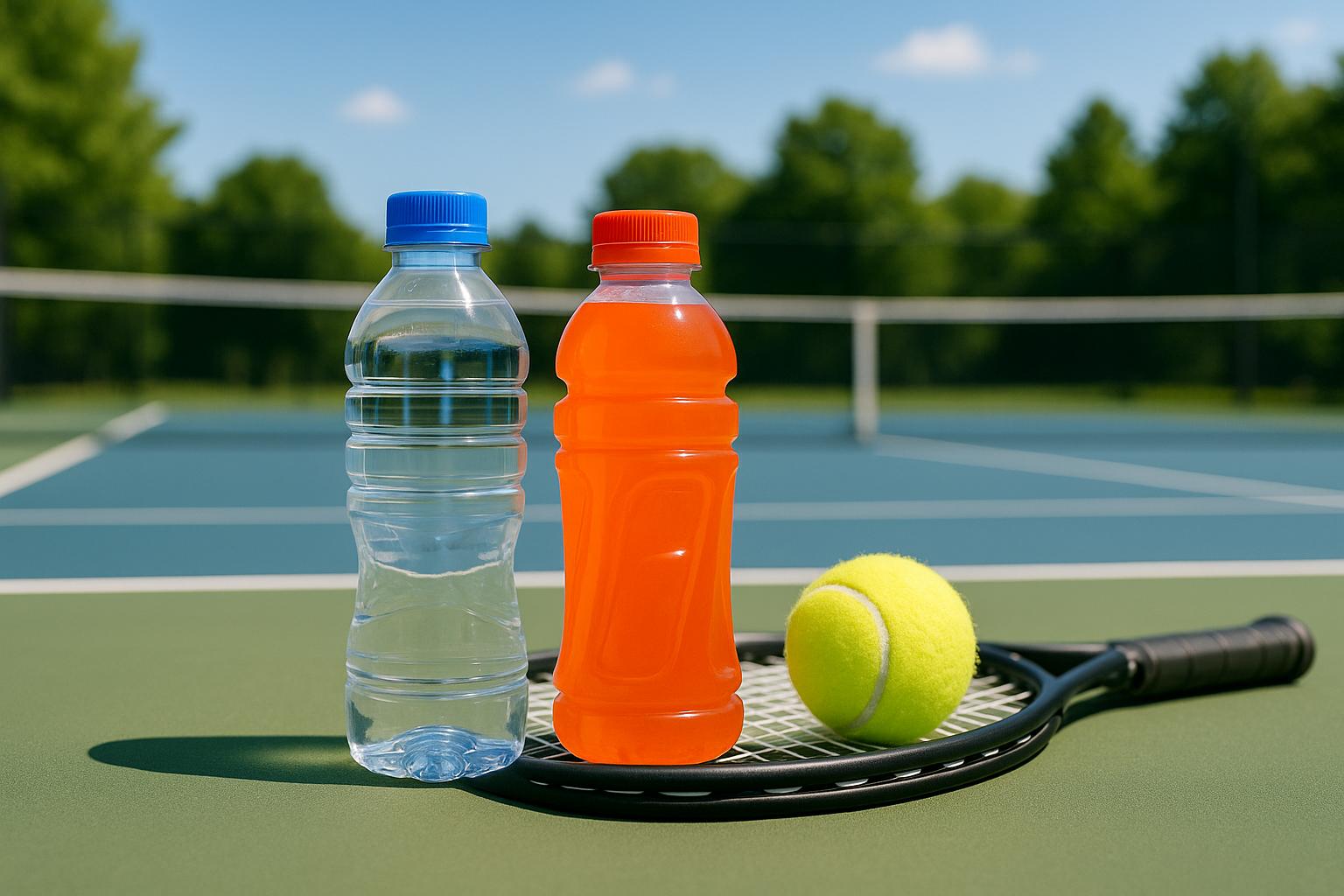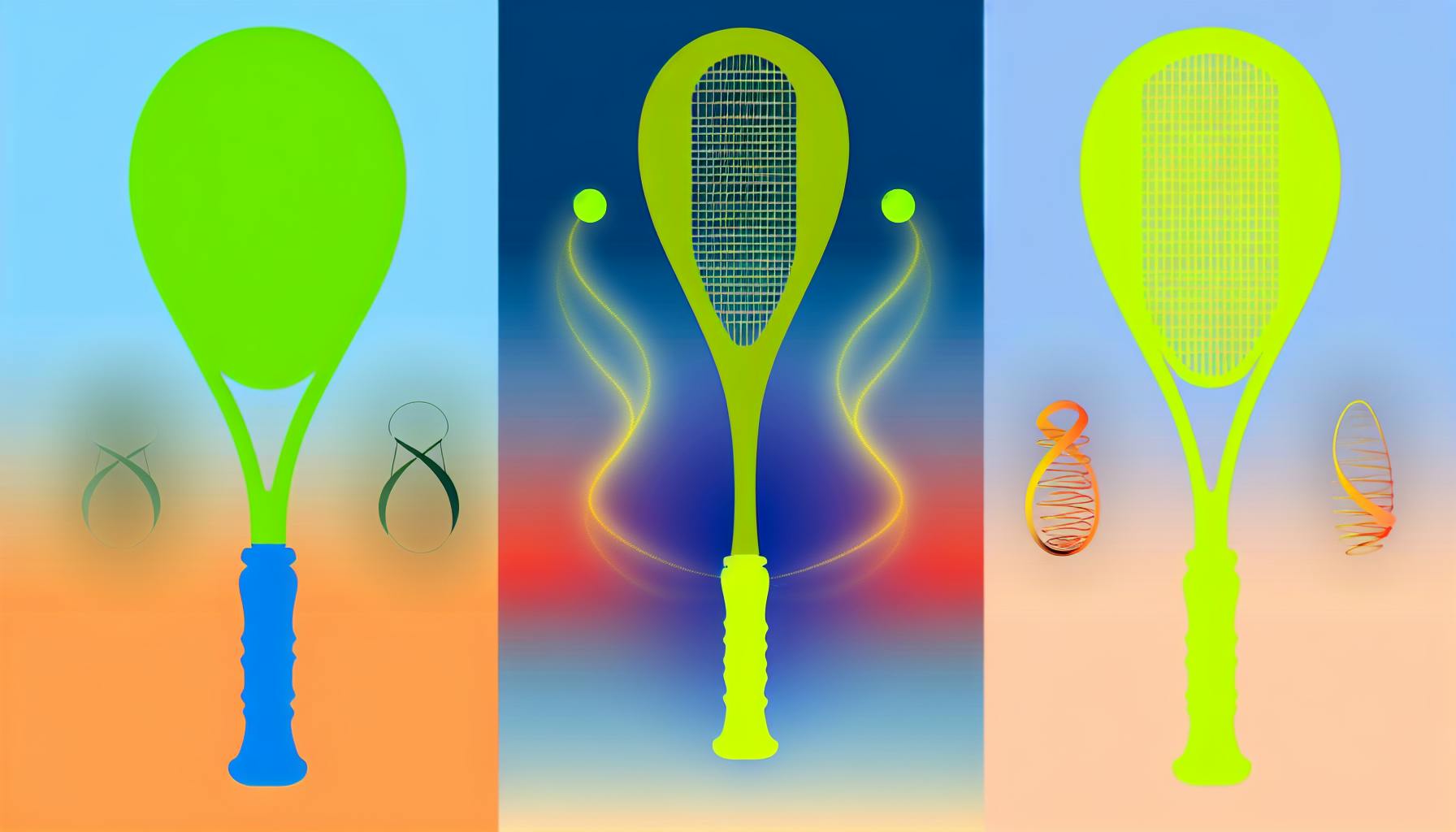Tennis demands explosive movements, endurance, and mental focus. Supplements can help meet these physical and cognitive needs, especially when diet alone falls short. Here's a quick breakdown:
- Why Supplements Are Important: Tennis players face energy depletion, sweat loss (up to 3 liters/hour), and nutrient deficiencies due to intense training and travel.
- Key Nutrients: Vitamin D (bone health), iron (oxygen transport), magnesium (muscle function), calcium (bone strength), B-vitamins (energy production), zinc (immune health), and electrolytes (hydration).
- Popular Supplements: Protein powders (muscle recovery), electrolytes (hydration), multivitamins (micronutrient support), creatine (explosive power), and collagen (joint health).
- Safety Tips: Always choose third-party-tested products to avoid banned substances and consult a nutritionist to tailor your supplement plan.
Supplements aren’t a substitute for a balanced diet but can complement it when used correctly. Let’s dive deeper into how they support training, competition, and recovery.
Are Supplements Necessary For Tennis Players? - The Racket Xpert

Key Vitamins and Minerals for Tennis Players
Playing tennis at a high level drains the body of essential nutrients. While a well-rounded diet is the cornerstone of good nutrition, certain vitamins and minerals are especially important for the explosive movements, stamina, and recovery that tennis demands.
Important Nutrients for Tennis Performance
Vitamin D plays a vital role in bone health, muscle function, and immune strength. For tennis players, strong bones are crucial to withstand the impact of quick direction changes and jumps, while healthy muscles are key to generating power for serves and strokes. Adults typically need 600–800 IU daily, but athletes who train indoors or live in areas with limited sunlight may require higher doses.
Iron is essential for transporting oxygen to muscles, which keeps players energized during long matches. Low iron levels can lead to fatigue and slower recovery between points. Female players are particularly at risk due to menstrual losses, and all players can lose iron through sweat. Recommended daily intake is 8 mg for men and 18 mg for women.
Magnesium supports hundreds of bodily processes, including muscle contraction and relaxation - both critical for a fast serve or a powerful topspin. It also helps convert food into energy and keeps the nervous system steady during intense moments. Athletes, who lose magnesium through sweat, may need more than the standard 400–420 mg for men and 310–320 mg for women.
Calcium works alongside vitamin D to maintain bone strength and support muscle contractions. Tennis places significant stress on bones, so players should aim for 1,000–1,200 mg daily.
B-complex vitamins are key to energy production:
- Thiamine (B1) helps convert carbs into energy.
- Riboflavin (B2) supports energy production and red blood cell health.
- Niacin (B3) aids metabolism and circulation.
- B6 is vital for protein metabolism, aiding recovery.
- B12 assists in red blood cell formation and nervous system health.
- Folate works with B12 to support cell repair and division.
Zinc is critical for immune health, wound healing, and protein synthesis. This is especially important during intense training or tournaments, where stress and exposure to germs are higher. Athletes may need more than the standard 8–11 mg daily due to sweat loss.
Potassium and sodium are electrolytes that regulate fluid balance and muscle function. These are quickly depleted during play, especially in hot weather. Sodium helps with hydration, while potassium prevents cramps and maintains heart rhythm during intense activity.
These nutrients are essential for tennis players, whether obtained from food or supplements, to keep the body functioning at its best.
Food vs. Supplements for Meeting Nutritional Needs
A diet rich in whole foods should be the first step in meeting nutritional needs. For instance:
- Vitamin D is found in fatty fish like salmon, fortified dairy products, and egg yolks, though sunlight remains the most effective source.
- Iron is abundant in lean red meat, poultry, fish, beans, and fortified cereals. Pairing these with vitamin C–rich foods, like oranges, enhances absorption.
- Magnesium can be sourced from dark leafy greens, nuts, seeds, and whole grains. A single ounce of pumpkin seeds provides about 150 mg, while a cup of cooked spinach offers roughly 160 mg.
- Calcium is available in dairy products, fortified plant-based milks, sardines (with bones), and greens like kale and collard greens.
- B-vitamins are found in whole grains, meats, eggs, dairy, legumes, and leafy greens.
- Zinc is plentiful in oysters, beef, pork, chicken, beans, and nuts.
However, food alone may not always meet the increased nutritional demands of tennis players. Factors like limited nutrient bioavailability can make supplementation necessary. For example, plant-based iron is harder to absorb than the iron in meat, and the body struggles to absorb large doses of certain nutrients, like calcium, all at once (calcium absorption caps at around 500 mg per dose). Spreading nutrient intake throughout the day is often more effective.
Combining a nutrient-rich diet with targeted supplements can help tennis players meet their elevated needs, ensuring they have the fuel and recovery support to perform at their best on the court.
Common Supplement Types and Their Benefits
In addition to basic vitamins and minerals, certain specialized supplements can cater to the specific demands of tennis players. Knowing which options are most popular - and why - can help players make smarter choices for both training and competition.
Top Supplements for Tennis Performance
Protein powders are a staple for many tennis players. These supplements assist in repairing muscle tissue after grueling matches or intense training sessions, especially when consumed within 45 minutes of finishing play[1][3]. Protein shakes offer a quick and convenient recovery option, but moderation is crucial. Overconsumption can lead to issues like gastrointestinal discomfort, and some powders may include added sugars or extra calories, which could lead to unwanted weight gain or blood sugar fluctuations.
Electrolyte supplements are key for maintaining hydration and avoiding muscle cramps. By replenishing essential minerals lost through sweat, they can help prevent fatigue and even improve groundstroke accuracy. When paired with carbohydrates in beverages, electrolytes enhance water absorption, keeping players hydrated and energized during long matches or training sessions.
Multivitamins come in handy during periods when maintaining a balanced diet is harder - like during rigorous training schedules, travel, or calorie restriction. These supplements help ensure players get essential micronutrients, such as folic acid and magnesium, which younger athletes often lack. However, they should never be a substitute for a varied and nutritious diet.
Other specialized options include creatine, which boosts explosive movements like serves and quick directional changes by fueling short bursts of high-intensity activity; glutamine, which supports recovery and strengthens the immune system during demanding tournament seasons; and collagen supplements, which promote joint health - a critical factor given the repetitive motions and impact forces in tennis.
While supplements are widely used in sports - studies estimate that 40% to 70% of athletes incorporate them into their routines[2] - they come with risks. Alarmingly, 10% to 15% of supplements may contain banned substances. From January 1, 2004, to December 19, 2012, 51% of class I drug recalls in the U.S. involved dietary supplements rather than pharmaceuticals[2]. This highlights a major concern: unlike medications, supplements are presumed safe until proven otherwise, making due diligence essential for athletes.
The table below provides a snapshot of these supplements, their benefits, drawbacks, and specific applications for tennis players.
Supplement Types Comparison
| Supplement Type | Advantages | Disadvantages | Specific Use Cases for Tennis Players |
|---|---|---|---|
| Protein Powders | • Aids muscle repair • Quick absorption • Convenient |
• Overuse may cause GI discomfort • May include added sugars/calories |
• Post-match recovery (within 45 minutes) • Meeting daily protein needs (1.5–1.7 g/kg/day) • When whole food protein is insufficient |
| Electrolytes | • Maintains hydration • Prevents cramps • Boosts performance • Enhances water absorption |
• Inadequate intake can lead to fatigue and cramps | • During hot/humid matches • Extended training sessions • Post-exercise rehydration |
| Multivitamins | • Fills micronutrient gaps • Supports general health • Useful during dietary restrictions |
• Cannot replace whole foods • Limited compared to a varied diet |
• Intense training periods • Travel schedules • When diet variety is limited |
Before starting any supplement regimen, tennis players should consult with a physician or sports health expert. Supplements are most effective when paired with a balanced diet and a solid training plan - they’re not a replacement. To avoid the risks of ingesting banned substances, look for products verified by third-party organizations like ConsumerLab.com, USP, NSF International Certified for Sport, or UL. Remember, athletes are ultimately responsible for what they consume, so careful and informed choices are critical.
sbb-itb-5591e69
Safety, Doping, and Supplement Quality
The supplement industry operates under far less stringent regulations compared to pharmaceuticals, which poses unique challenges for tennis players. While medications must pass rigorous testing before they hit the market, supplements don't face the same level of scrutiny. This regulatory gap means athletes must take extra precautions and seek expert advice to avoid potential risks.
How to Use Supplements Safely
Before incorporating any supplements into your routine, it's essential to consult a sports nutritionist or a doctor familiar with anti-doping guidelines. These professionals can assess your individual needs and help you steer clear of harmful combinations or dosages - especially if you're already taking medications or have pre-existing health conditions.
The lack of strict oversight in the supplement industry means products can sometimes contain undeclared substances, inaccurate labels, or even counterfeit ingredients. These issues significantly increase the risk of unintentional doping violations [4][6].
A smarter approach is to prioritize whole foods. Collaborate with a nutritionist to optimize your diet and meet your nutritional needs through natural sources first. Whole foods not only reduce the risks associated with supplements but often offer better nutrient absorption compared to synthetic options.
If you do decide to use supplements, keep a detailed record of everything: product names, batch numbers, dosages, dates, and notes from consultations. Such documentation can be invaluable if you're subjected to drug testing.
Anti-Doping Rules and Regulations
Even with careful planning, strict anti-doping rules make thorough supplement verification a must. Alarmingly, 30% of anti-doping rule violations in tennis have been linked to supplements [5]. Between 2015 and 2022, product contamination accounted for 8% of all anti-doping violations, and studies suggest that as many as one in ten supplements may be tainted with banned substances [6].
Under the World Anti-Doping Code, athletes are held to a principle of strict liability. This means even accidental contamination can result in suspension. Anti-doping organizations, including WADA, do not certify or endorse specific supplements [4][6]. The responsibility for ensuring a product's safety and compliance falls entirely on you. Before using any supplement, dig into the details: examine the ingredient list, verify quantities, research the manufacturer’s track record, and ask about their contamination prevention measures and testing protocols.
To reduce risks, stick to batch-tested supplements that have been independently verified by trusted third-party labs. Look for certifications from programs such as NSF International Certified for Sport or Informed Sport - these seals indicate a higher standard of safety.
When completing your Doping Control Form, make sure to accurately list all supplements you're taking. While this won't protect you from penalties if banned substances are detected, it demonstrates a proactive effort to comply with testing protocols.
Finally, take advantage of available resources to educate yourself. WADA’s Anti-Doping Education and Learning (ADEL) courses offer valuable insights into supplement risks and best practices. Since supplements are a leading cause of accidental doping, dedicating time to understand these risks is a wise move for any tennis player serious about their career.
How to Use Supplements for Tennis Training
A well-thought-out supplement plan can enhance your tennis training, competition performance, and recovery process. Whether you're pushing through intense practice, gearing up for a big match, or recovering afterward, tailoring your supplement use to each phase can make a noticeable difference.
When and How to Take Supplements
Start by establishing a consistent routine for essential vitamins and minerals like vitamin D, B-complex, and magnesium. Taking these with meals helps improve absorption and supports overall health.
For performance boosters such as caffeine, stick to your usual dose before matches to sharpen focus and energy. Avoid experimenting with new supplements on match days - your body needs time to adjust to any changes.
Post-match recovery is just as crucial. Opt for protein and electrolyte supplements shortly after playing to aid muscle repair and rehydration. This is especially important during tournaments with multiple matches in a day.
During competitive periods, simplify your supplement routine. Focus on products you've already integrated into your daily habits to avoid any surprises or side effects.
Traveling for matches? Gradually shift your supplement schedule to align with new time zones. This adjustment helps maintain consistency in both performance and recovery.
Supplement Plans for Training, Competition, and Recovery
Your supplement plan should evolve with the demands of your tennis calendar. Here’s how to adapt it for training, competition, and recovery phases:
| Phase | Primary Focus | Key Supplements | Timing Strategy | Special Considerations |
|---|---|---|---|---|
| Training | Build strength, endurance, and skills | Protein, creatine, essential vitamins | Take consistently; consume protein soon after workouts | Increased energy demands and hydration needs |
| Competition | Sustain peak performance and energy levels | Electrolytes, caffeine (if tolerated), easily digestible options | Stick to pre-match and in-match routines already established | Prioritize comfort and hydration |
| Recovery | Repair muscles and reduce inflammation | Protein, omega-3s, vitamin D, zinc | Spread recovery supplements throughout the day | Focus on rest and quality sleep |
During training, your body faces greater physical demands. This is the time to refine your supplement routine and test new products - tracking how they impact your energy, endurance, and recovery.
In competition, simplicity is key. Stick to supplements you've already tested during training to minimize risks. Many professionals rely on a streamlined routine during tournaments for this reason.
Recovery is all about healing and recharging. Use supplements that promote muscle repair and help manage inflammation, all while maintaining a nutrient-rich diet. Prioritizing rest and sleep during this phase can set you up for long-term success.
When transitioning between phases, make gradual changes to your supplement plan. Sudden shifts can sometimes lead to unwanted side effects, so give your body time to adapt.
Lastly, remember that supplements affect everyone differently. What works for one player might not work for another. Keep track of how your body responds to fine-tune a strategy that fits your individual needs.
Key Points for Tennis Supplementation
Tennis supplements, when combined with proper nutrition, adequate rest, and consistent training, can support both performance and recovery. However, the world of supplements comes with its challenges. Unregulated production can result in misleading labels or even contamination, so it's crucial to double-check products for reliable certifications before use.
For competitive players, the stakes are even higher. Anti-doping rules in tennis are strict, and athletes are held accountable for any prohibited substances found in their system - this is known as strict liability [5]. This means every supplement you take must be carefully vetted to avoid unintentional violations. While no method can fully eliminate the risks, making informed choices can significantly lower them.
FAQs
What’s the best way for tennis players to choose the right supplements for their training and recovery needs?
When selecting supplements, tennis players should first assess their personal needs. This might involve something as simple as a blood test to spot deficiencies, like low vitamin D levels. From there, focus on options that boost energy, hydration, and recovery - think protein powders, BCAAs, and electrolytes. It’s crucial to choose products that have been tested for safety and purity, ensuring they meet high standards. Ultimately, your choices should align with your training objectives and energy requirements to effectively support your performance.
What are the risks of taking supplements, and how can tennis players avoid banned substances?
Taking supplements isn't without its risks. Some products may be contaminated with banned substances, potentially leading to failed drug tests and serious consequences. Others might include harmful ingredients or cause unexpected health problems.
To minimize these dangers, it's essential to take precautions. Opt for third-party tested supplements to ensure quality, verify product batch numbers for added assurance, and consult a healthcare professional or nutritionist to determine if you even need supplements in the first place. Prioritizing safety and staying compliant with anti-doping rules is crucial - not just for your health but also for safeguarding your career.
Why should tennis players focus on whole foods instead of supplements, and when are supplements necessary?
Tennis players should prioritize whole foods in their diet because these foods naturally deliver a variety of essential nutrients like vitamins, minerals, fiber, and healthy fats. These nutrients are crucial for maintaining energy, aiding recovery, and supporting overall health - benefits that supplements alone can't entirely match.
That said, supplements can play a role in certain situations. They might be useful for addressing nutrient deficiencies, meeting the demands of intense training, or speeding up recovery after matches. For instance, supplements can assist with muscle repair or help replenish electrolytes when whole foods fall short. However, it's important to consult a healthcare professional before introducing supplements into your routine.


